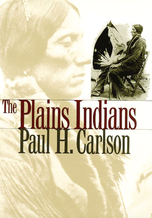A WRITER'S WIT |
My Book World

I grew up in Kansas amid the Great Plains, and I have lived my adult life in what is locally called the South Plains of Texas. As a child, because of all the Indian street names (Seneca, Pawnee, Osage) in my Wichita neighborhood, and because of artifacts I found, I believed there was an invisible life beneath the “civilization” that had been superimposed over the top of the previous one. Well, Professor Carlson unveils that previous world so that it is no longer invisible. Through detailed treatment of Indian life—its beginning, how horses and bison effected change, economics, the various social structures (tribes differed), war with other tribes as well as whites, and reservation life—he portrays the truth about native plains cultures. Indian tribes were quite capable of assimilating change, sometimes to their detriment. Slowly, over a century and a half, European culture squelched or eviscerated Indian life, breaking treaties and reservation agreements when it suited the federal government to take land that it wanted. One can only imagine the sort of country the U.S. would be today if Europeans had treated the Indians (as many as five million coast to coast) fairly and with respect: perhaps there would have been no African slave trade, there would have existed cities of mixed heritage, Indian forms of governing that might been fairer than our amalgam of democracy and capitalism which seems to eat human flesh at an astounding rate: Perhaps less greed and more consideration for all human life.
I could be wrong, but I encountered a couple of typos that a copyeditor at an academic press should not have missed:
On page 49, the author uses “dominate,” a verb, for what should be “dominant,” an adjective: “Just over a century later, the Plains Indians were living on reservations, and many of their traditional ways changed again—or for a time endured—beneath dominant white culture before reemerging again in the twentieth century” (49).
On page 174, the author misspells “possessed” by omitting the first “s”: “In 1890 fifty-nine agencies possessed an Indian law-enforcement squad” (174).
These errors mar an otherwise scholarly and informative book.
FRIDAY, January 8, 2021 | My Book World: Harold Brodkey's First Loves and Other Sorrows



 RSS Feed
RSS Feed